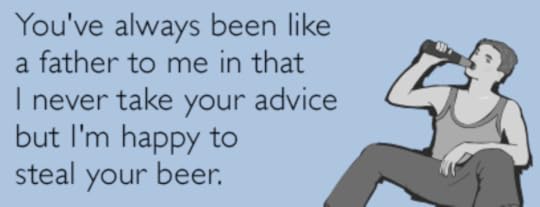Paul E. Fallon's Blog, page 16
August 17, 2022
Mental Health III: You Were Never Sick, Get Yourself Better
The third in a series of five essays about Mental Health to celebrate the dog days of August.
Mental Health II: Suicide is Painless

When you have a substitute school bus driver, it doesn’t much affect your life. When you have a substitute teacher, you know you’re in for an easy day. But when you walk into a room to encounter a substitute therapist, you think: this will be useless.
That actually happened to me in 1990. I was still pushing the Sisyphusian rock uphill against my nature, juggling my own firm with a toddler at home and second on the way. My usual therapist, a mousy woman who was neither effective nor harmful in the futile struggle to be happily straight, was absent. In her place sat a man in his early thirties with thick black hair and chiseled features. If he smiled he might have been handsome, though I intuited immediately I would get no smile out of him.
I figured the next forty-five minutes would be a waste, but I’d already forked over my co-pay, so I rattled off my mental health history. By this time, I could hit the high points in eleven minutes, twelve tops.
“You’ve been telling yourself this story for, how long?” His opening gambit was different. “You are gay. There is no doubt about it. Until you acknowledge that, and accept that, you can come to therapy forever, but your situation is not going to change. The only way to get your life on a path that makes sense, is to come out.”
“Who do you think you are? I’ve spent fifteen years, with too many therapists, trying to find balance. My whole life is structured around this.”
“And you’re still miserable.”
Thus we volleyed through the remainder of the session. I left, angry. Angry at having a substitute. Angry at his insistence. Angry at him even questioning the construct all the other therapists had drilled into me. I had a child, another arriving soon. I was dug very deep; I could see no option but to keep burying.
Truth is an invasive species:
once it finds fertile ground it spreads.
Yet even in my anger, I realized solace in finally hearing the truth. He challenged me, yes. But he did not condemn me. And though it took several more years, that single interchange with that abrasive therapist was the turning point in my understanding. I might well suffer mental anguish and depression my entire life, but if there were any chance of easing it, I would have to true to that aspect of my nature that lay contrary to the rest of me.
Truth is an invasive species: once it finds fertile ground it spreads. The storyline of my life became increasingly tenuous. I finally decided to tell my wife, which I did in a therapy session (we were also in couple’s therapy). I recommitted my love for our family, I reinforced there had been no affair, nor even dalliance. It had not occurred to me that this would be the end of our marriage (the forever part of Catholicism obscures the reality of actual living). Yet by the end of the session, I knew we were through. My wife was not entirely surprised. But in stating the verboten aloud, I had broken the spell. We were through. She would set the terms.
Within the year I was living alone in a half-furnished house, working out of the attic, spending too much time with myself and two toddlers, more depressed than ever. Suicide was no longer an option: I was responsible for two children. Beyond that, my will to live was zilch.
Talk therapy was unthinkable: all those years of misguided talk soured me on psychotherapy. I’ve always been sensitive to medication: two aspirin will squelch a splitting headache. However, I finally agreed to the lowest dose of Zoloft. My doctor cautioned me to side effects that could flower in three to four weeks. On cue, three weeks from kicking off my daily dose I found myself sitting on the carpet mid-afternoon, watching a TV game show. Laconic…subdued…alien. I skipped my pill the next day, and the next. Called my doc, told him thanks but no thanks.
Thus, I had no faith in religion, talk therapy, or meds. Yet depression continued to cyclone through me. The only thing that was ever going to help me feel better: was me.
Over time—a lot of time—the fact of I was the only one who could truly help myself became clear. And with that realization came a sharper perspective. I was not mentally ill. I had never been sick. There was never anything wrong with Paul Fallon aside from not fitting the expectations of family and church and community. Expectations that I absorbed as inviolable truths, even as they labelled me faulty.
Long ago a therapist asked, “When are you going to get angry at your parents?” I laughed and replied, “Never. I was the last of four kids in four years. They had no idea what they were doing. They were clueless and probably harmful, but they weren’t malicious.” Unsatisfied with my detached perspective, he counselled me to get angry, to embrace catharsis.
Perhaps he, and all my other therapists, would be relieved to know that I bear none of them any ill. Like my parents, they operated within the spectrum of their own constraints. Once I realized that I was not ill, had never been ill, I had no need for therapists or drugs to cure me.
But even as the major identity confusion of my life got resolved, depression continued to strike, erratic yet deep. And anxiety started coming at me with greater velocity.
August 10, 2022
Mental Health II: Suicide is Painless
The second in a series of five essays about Mental Health to celebrate the dog days of August.

On Friday March 28, 1975 I tried to kill myself.
I failed.
I hadn’t failed at much in life, at least not on paper. I was a twenty-one-year-old junior at MIT, son of a lower-middle class family from Oklahoma, on a full-ride. Honor student in Civil Engineering. Devout Catholic. Fraternity brother, acapella singer, fair runner, excellent dancer. Not bad looking. Nice girlfriend from Wellesley. Terrific sense of humor. Distinguished laugh.
In my head, I was an utter failure. Fat. Pimply. Uncoordinated. (Ignore all photo and complementary evidence to the contrary.) Academic sham. (Everyone knows Civil Engineering is the easiest major.) Landed where I did by geographic affirmative action.
I suppose one way to slice mental health is to measure the discrepancy between our objective and subjective selves. Narcissists’ internal thrall with their own greatness outstrips actual evidence. Depressive’s certainty of their worthlessness ignores realistic assessment.
My action didn’t erupt out of nowhere. I’d always been temperamental and judgmental, especially against myself. I minimized the pressures of school, though I vomited several times a week. I’d seen an in-house therapist; a jovial, patrician man, all hale and hearty. The first person to whom I revealed discomfort around other guys. He offered the word ‘homosexual,’ which I denied. Then he replied, “Well that’s good. Tell me about your girlfriend.” Thus began the mantra that haunted my next twenty years: I suffered inappropriate feelings about men, which manifested as depression. The therapeutic solution was to learn how to ignore the feelings, thus alleviate the desperation.
Spring of sophomore year I came unglued in the middle of structures lab. I removed myself to a bathroom stall, where I cried. And cried. I tossed a few things in a backpack and caught a bus to New Jersey, where my parents had moved. “What are you doing here?” sums up the limit of their understanding. We circled each other in wary politeness for a few days, until I bused back to school. I cannot recall why I thought my parents would offer solace to my confusion; I never entertained that fantasy again.
So when I hit a dark place the following Spring, the options were few, the prospects illegible. I rummaged through the medicine cabinet of our communal bathroom and opened a bottle of pills labelled with the name of a brother I could not admit to fancy. His remedy would be my end. I downed the bottleful, felt woozy, and fell asleep. In keeping with this B-movie script: I tried to kill myself on Good Friday.
I suppose I got off easy:
ten years earlier my complaint would have sent me
straight to electroshock therapy.
I woke Saturday; disappointed. Hauled myself out of bed and went about my day. I don’t remember who I told, or when, but after our Easter Sunday meal, I endured what these days we call an intervention. I promised my sister and brother-in-law, girlfriend, and several brothers not to do it again. I knew the promise was hollow. Next time I’d plan better, and avoid this whole scene. They also coerced me into real therapy. An actual shrink.
By 1976 the American Psychiatric Association had struck homosexuality from their legion of disorders, but apparently that news had not yet reached the provinces of Brookline, where I paid $75 per session out-of-pocket—money I scarcely had—to hear again and again how I must divert my feelings about men by focusing on the little woman. I suppose I got off easy: ten years earlier my complaint would have sent me straight to electroshock therapy.
By fall, I was declared ‘cured,’ and equally relieved for two reasons: I could no longer afford the advice; and my girlfriend had broken up with me. Who could blame her? I actually preferred to be a jilted male with a bruised heart than an actual boyfriend.
My attempted suicide and subsequent therapy set in place a mindset that remained intact for fifteen years. I made the conscious decision to be straight, earnestly believing it was my decision to make. My girlfriend returned, I never understood why, though I suspect my non-traditional masculinity appeals to strong women, and I’m a few digits away from being a full-on Kinsey Six. We married.
The ground rules of our marriage were clear, though never discussed. I was a presentable spouse on the outside, though damaged goods within, which only she could repair. I leaned on her to understand me better than I understood myself. Followed her for her career. Went to therapy whenever she told me I needed it.
This balance held through graduate school and first jobs and two children and buying a house. Until I disintegrated in grand scale at rapid speed; the exploration of the next essay.
My attempted suicide colors my life in constant ways. One unconventional attitude I took from trying to kill myself holds fast. I have no regrets about what I did on that black night. Never have. I feel no blessing in having failed. I no longer wanted to live. I believe that every human should be allowed to take their own life, and their suicide should be honored by those who remain. This is, of course, at odds with a society that abhors the idea of suicide, reinforced by a mental health establishment that rejects the action. As a gay man who attempted suicide in large part because the mental health establishment labelled me ill, forgive me if I don’t buy that line.
I often wonder what my life would have been like if any therapist in 1974, 75, 76…even 1986, had said, “Paul, you might be gay and that would be fine.” No one ever did. Instead, dozens told me over those years, “Paul, you might be gay and we can fix it.” They never could.
August 3, 2022
Mental Health I: Why Do I Write?
The first in a series of five essays about Mental Health to celebrate the dog days of August.

I’d been writing words and sentences since the first grade. As a person of engineering temperament, I expressed myself with logic and clarity (my specifications for concrete were top-notch). But I can pinpoint the specific date when I first tried to express the vagaries of my heart and soul. Summer 1996. Sitting at a picnic table under a tree outside a weathered guest house in Provincetown. Scribbling phrases on notecards to make sense out of the lightening chaos with which this stable married family man became a single gay dad.
My therapist at the time—I can’t remember which one, there’ve been so many—counseled me to journal. Really? No thanks. I saw little to be gained in documenting my screwed-up present. Instead, I selected points of experience as the premise for a barely-concealed autobiographical novel. It took me three years to complete Sing Out Loud. When I began, I had no idea how the book—or my life—would resolve. The manuscript sits in a box on a shelf, which is where my amateur effort belongs. But creating the book became a case of life imitating fiction: I literally wrote myself to a happy ending. The process brought me immeasurable value, and established writing as my preferred form of therapy.
Next up? My troubled childhood. Weekends in Holy Land. Three brothers confront the illusion of youthful potential against their adult reality. It’s a much better novel. Someday, I might actually dust it off and put it out there. Still, it’s most useful examination is how straightjacket Irish Catholicism sunk its claws into a pudgy little—maybe—faggot.
After two attempts I realized, I’m no novelist. I am, however, pretty fair at personal essays.
Over a decade ago, riding high during my Bikram yoga addiction, I’d never felt so energized, so limber, and so compelled to share my euphoria. My peak yoga enthusiasm corresponded with peak blog craze, thus I went public with www.theawkwardpose.com.
About a thousand folks subscribe to The Awkward Pose. I have no idea why. The blog has little theme beyond a particular author. The focus has evolved from yoga, to Haiti, to bicycling, to tomorrow, to… Over time, my blog has become more political, in keeping with my personal evolution. But most often, essay topics are simply what’s on my mind. A place of personal catharsis in an unnecessarily unjust world.
Yet…even with writing
as my principal mode of psychic balance,
I’ve never written about mental health.
I’ve ceased any illusion to become a well-known blogger. I write what I want and post it to the world. I do no promotion. If someone finds my essays and likes then, all good. If I influence someone’s ideas about our world, even better. If not…oh, well.
The blog’s byline is: seeking balance in a world of tension. There’s truth in that statement, but it’s also misleading. Because there are elements of my life—important elements—that I’ve never written about, honestly. The primary one being: my mental health.
Like all true progressives I parrot the notion that mental health is an equal aspect of our overall well-being. No need to hide or disguise it. Yet, for decades, even with writing as my principal mode of psychic balance, I’ve never written about mental health.
During the pandemic, I faced renewed mental struggles: I am not alone there. After years away from therapists, groups, and medications, I once again had to navigate our inept health care system in search of guidance. At a primary level I failed: I could not find a single therapist to take me on. And in that failure likely lies my growth, for I tackled my demons, through reading, and workbooks, and writing; with more disciplined focus than ever.
I’ve made enough progress that I’ve decided to share, through a series of essays, my personal struggles. Not because I want sympathy: I know how fortunate I am in life. Because, if I am struggling with all of this sh*t, pretty much everyone else is too.
The only way out is through. And it will be easier to get through, if we are all in it together. Read on.
July 27, 2022
A New Narrative

We are stuck.
On one hand liberals, or progressives, or left-wing, or Democrats, or whatever you want to call them; are hell-bent on subdividing our nation into ever tightly defined ‘identities.’ According to them, I am a cis-gender gay white male occupying land once inhabited by the Massachusett people who uses ‘he’ series pronouns, recycles, doesn’t buy meat, and rides a bicycle.
On the other hand, conservatives, or traditionalists, or right-wing, or Republicans, or whatever you want to call them; are hell-bent on measuring liberty and justice for all according to a yardstick ticked off in the 1950’s. According to them I am a successful property owner who racked up a big bank balance without government handouts, who invests on Wall Street, listens to country music, watches Chicago P.D., and drinks PBR.
Both of these synopses of my personal life are accurate; neither is complete. Similarly, the world views ascribed by the two poles of our political arena each hold some truth, but they are selective truths. The Left’s constant parsing into ever-tighter identities pulls us further from a collective identity; while the Right’s vision of a unified America demeans most anyone who is not a heterosexual white Christian.
I believe in Martin Luther King Jr.’s adage, “The moral arc of the universe is long, but it bends towards justice.” These days, that arc seems mighty long and shallow.

Political theories, and their power, run in cycles, often 40 to 50 years in duration. The excesses of the 1890’s Gilded Age led to the 1930’s Depression, which realigned our politics along the New Deal. The idea of government providing a base of social cohesion for all appealed to the majority of Americans, so long as that cohesion was predominately Christian and white. During the 1960’s and 70’s, Blacks and Browns and gays clamored for a slice of the Great Society until Nixon’s “silent majority” commandeered the conversation by electing Ronald Reagan in 1980. Ever since, our federal government parrots getting smaller (despite growing bigger), while it delivers fewer services, reduces individual protections, and increases corporate influence under the guise of free enterprise. Gilded Age 2.0.
There will be a shift in our political direction. Whether it occurs in response to outlawed abortions, or negligent climate response, increased economic inequality, or erosion of personal freedoms, I do not know. Whether we can vote ourselves back into a semblance of democracy or the US will actually suffer a full-blown authoritarian regime, I do not know. Whether our discord results in armed conflict or we can find stasis through peaceful resolution, I do not know. What I do know is, given the duration of the current rightward flow, a correction is due; and given the speed at which our government is moving contrary to the will of a majority of citizens, that reckoning may be soon.
Along with new politics will come a new narrative. The collective story of who we are and what we believe. I don’t subscribe to either of the current narratives because “diversity” is not a sufficient rallying call to bring people together; and “MAGA” is an illusion built upon fear.
I propose a new narrative, one that’s both aspirational and encompassing. Although its roots come from two experiences in an unlikely place: Haiti.

I travelled to Haiti often after the 2010 earthquake, designed and supervised construction of two buildings there, and lived in a mission run by evangelical Christians. Toward the end of my time, they asked me to preach at their Sunday service. I asked, “Why do you invite me, when you don’t agree with much about my life?” The response: “Because when we needed help, you came.”
A less-rosy corollary: I never met a Haitian who described himself as gay. People knew what the term meant. Men had sex with men. Men were nelly and everyone knew it. But no one applied the label ‘gay’ to themselves, nor tacked it on anyone else. People accepted, “Don’t ask, don’t tell.” But I witnessed how it hindered folks. The men on the DL. The women they married for cover.
The first vignette betrays the arrogance of affluence. People in Haiti know they cannot make it alone, while the United States is so wealthy we imagine that we don’t need others; so confident we actually believe our autonomy myth. The second story illustrates the corrosive power of secrets. When we do not allow people to be themselves, fully and open, everyone is harmed.

Today the United States is so puffed up in our affluence (more illusion than reality, but that’s another essay), we feel free to divide and divide and divide without realizing that every time we cordon off ourselves, we forfeit allies, we forfeit support, we forfeit each other.
The wealthier a nation is—in every measure—the better it can embrace a full array of opinion and choice; the less it need to dwell in want or fear. It is time for us to reframe our divisions as a sign of our strength. Embrace that our affluence liberates us to be open and inclusive. Flip the dueling narratives of fear and division on their head. Acknowledge that social change is not moral decline. Accept each person’s way of being as valid, deserving respect.
My new narrative: The United States is so bountiful, and so secure, that we welcome every person to be their true selves.
Quixotic? Perhaps. Idealistic? Sure. Achievable? I believe so.

The key to the new narrative’s success: mutual respect. So let’s step down from the lofty to the mundane and explore how mutual respect might actually work. Consider the pronoun conundrum that we encounter daily in left-leaning cities, a ‘problem’ that barely deserves to register on any list of the major challenges we face, yet is an everyday irritation—sometimes confrontation—that wears us down. Some people want to be referred to as ‘they’ rather than ‘he’ or ‘she.’ It’s a construction that’s never escaped my mouth with any grace. But I figure, if it’s important to this person to claim a unique identity, I can try. That is me showing respect. But when I fail to properly execute a change in language that’s existed for thousands of years, don’t get all militant: cut me some slack. Understand that you are asking others to make special accommodation for your preferences; asking us to make a conscious change to something which has been reflexive for centuries. Realize that my mistake is not personal, or even a microaggression. It’s simply human. Respect me in return.
July 19, 2022
1776: All Over Again
 1969 Broadway Production starring William Daniels as John Adams and Howard DaSilva as Ben Franklin
1969 Broadway Production starring William Daniels as John Adams and Howard DaSilva as Ben FranklinMy God, Paul, how many times have you seen this show? The thought synapsed through my brain as the lights dimmed on a covey of actors in revolutionary era brocade and buckles belting, “For God Sake, John, Sit Down!”
My quick recall: five times.
The original Broadway production, in 1969, when this teenage theater maven-in-the-making snagged a pair of half price matinee TKTS. The MIT Theater Guild’s college production circa 1975. A summer stock version with my own youngsters about twenty years ago: an easy spoonful of American History. The New Rep’s non-traditional-cast version four years ago, in which Ben Franklin was a woman, Martha Jefferson a male, and…whatever. Now, Diane Paulus and ART’s no-male casting of this rather hoary chestnut.
John Dickinson to John Adams:
You, sir, are merely an a-gi-ta-tor, disturbing the peace, creating disorder,
endangering the public welfare—and for what?
Your petty little personal complaints.
 2002 Broadway Revival – still all men
2002 Broadway Revival – still all menI don’t especially like 1776. It’s a problem musical, with a long, long dialogue interlude taking up most of the first act, songs that feel glommed onto the action, and an ending that—well—we all know how it ends. Yet, 1776 has its moments. For me, “Till Then,” the love ballad between John and Abigail Adams, and “Momma Look Sharp,” a haunting psalm on war’s futility, are remarkable, if unconventional show tunes.
Caesar Rodney:
Stop it! Stop it! This is Congress. Stop it, I say! The enemy is out there!
Dickinson:
No, Mr. Rodney, the enemy is here!
 New Rep Gender/Race blind cast
New Rep Gender/Race blind castPerhaps the fifth time is the charm as I found Ms. Paulus’ vision of 1776 my favorite, by far. She made one big move—no one in the cast presents as male—and then held the good restraint to let that speak for itself. I could not identify one place where she changed the script or a lyric, and yet knowing that the actors wouldn’t have been “Founding Father” material in the day, gave many of the lines enhanced relevance.
Franklin:
Why, Mr. Dickinson, I’m surprised at you!
You should know that rebellion is always legal in the first person—such as “our” rebellion.
It is only in the third person—“their” rebellion—that it is illegal.
 ART 2022: Female/non-binary cast
ART 2022: Female/non-binary cast1776 was a hit in its day, winning Tony Awards for Best Musical and Best Book. Yet, I never really appreciated the book until this recent production. Could history so clover be accurate? I checked the script out of the library and read it aloud. Wonderful! Including an Afterward that clarifies exactly what is specifically true and what historical facts have been shaped for dramatic purposes. By popular theater standards, the history is very good.
John Adams to Abigail:
I have always been dissatisfied, I know that
But lately I find I reek of discontentment!
It fills my throat and floods my brain, and sometimes—
sometimes I fear that there is no longer a dream,
but only the discontentment.
 ART 2022
ART 2022Which got me thinking about 1776 and 1969 and 2022. Three periods of tremendous social unrest. How accurately, the words, the emotions, and the injustices of one time find relevance in another, and another.
John Adams:
Mark me, Franklin, if we give in on this issue (abolishing slavery),
posterity will never forgive us.
Franklin:
That’s probably true. But we won’t hear a thing. John, we’ll be long gone.
And besides, what will posterity think we were—demigods?
We’re men—no more, no less—trying to get a nation started against greater odds
than a more generous God would have allowed.
John, first things first! Independence! America!
For if we don’t secure that, what difference will the rest make?
 ART 2022: The only time the cast presents as female, in this tragic tale of a lost son
ART 2022: The only time the cast presents as female, in this tragic tale of a lost son1776 at the ART in Cambridge only plays through July 24. See it if you can; it’s terrific. But don’t fret if you cannot. The show is on to Broadway, and likely a national tour. Coming soon to a city near you.
July 13, 2022
I Dreamed a Dream

Sunday morning, July 3. Walking to the gym through a deserted city. Seventy degrees. Overcast. Listless. I love summer in the city. The Whole Foods crowd has Tesla’d off to their beaches and mountains. Leaving behind quiet stillness, a smattering of foreign graduate students, and street people. Plus me, decked out in shorts and a straw hat and whatever adjectives apply to a guy who could be gone, but rejects the hassle required.
I cross empty Mass Ave at Porter Square. Before I reach the far curb I hear music. Loud music. Stirring music. “I Dreamed a Dream.” The original, Les Miserables soundtrack. When I reach the sidewalk I pause and seek out the source. Tucked in the weird little court near the subway station, shaded by a few trees, behind the Blue Bikes kiosk, sits a man. A burly guy with a tight white beard and ample, shapeless body. Barriered by a rolling suitcase and an assortment of shopping bags. I cannot see the boombox source of song. But it sure is loud. I cannot hear the man’s singular voice. But he sure is singing along. With enthusiasm.
I stand, transfixed by the anthem. Not of nationhood, on this Independence Day weekend. Rather of personhood. I dreamed a dream in times gone by… What do these lyrics mean to this middle-aged, likely homeless, man? When hope was high and life worth living… His outward appearance is not high, his life questionably worthy by most measure. I dreamed that love would never die… Could I imagine the warmth of love in his life? I dreamed that God would be forgiving… What had he ever done to deserve winding up here, by himself, on a gorgeous summer day, surrounded by a moat of motley possessions?
The guy was into it. Head bobbin’, mouth jammin.’ I could not help but smile. The tigers came at night, they teared his hope apart, they turned his dreams to shame. But here he was, still alive, still making music. Dashed hopes be damned.
 The singer behind the Blue Bikes Kiosk
The singer behind the Blue Bikes KioskI am civil to street people. I greet them, acknowledge them. I meet their gaze. But this guy does not see me. He is lost in a world far, far from Porter Square, someplace where he is vibrant and whole and full of promise once again. I want to believe that, in this moment, he is happy. For on such a fine summer day, don’t we all deserve to be happy? For the fact that his soulful singing reveals a humanity deeper, richer, than I’d ever granted a street person. A humanity that commands me to stop. To listen. To appreciate. To pray that whatever hope this man has lost, he will find once again.
The gym crowd on a sultry summer morning is scant as the citizens outdoors, weighted towards those who cannot afford to be elsewhere. Still, I have a great workout, and gift myself two sessions on the massage bed. I leave, showered, and fresh. Jay-walk across Mass Ave. But before I turn the corner at Upland Road I hear it again: more music. I stop. Cross back. There he is, still. Singing loud and proud. A song I do not know, Unreachable something. Not The Man of La Mancha unreachable. Something else. Fresher. Hipper. I smile and turn away. Hopeful that my fellow summer dweller finds his happy place in his song.
July 4, 2022
This Independence Day: Free the Territories

It’s not often that Supreme Court Justice Neil Gorsuch and I land on the same side of an issue. When it happens, the subject in question must occupy that obscure tangent where progressive ideology and libertarian thinking meet. Points of agreement always worth exploring.
Back in 2018 I wrote a series of essays under the banner ‘A Soft Landing’ which posited ways in which we might remedy the challenges facing our nation short of violent revolution. In the four years since, none of my suggestions have taken hold, yet we have witnessed an insurrection and appear closer to active revolution than any moment in my lifetime. A Soft Landing outlined, first and foremost, the need for a new Constitution. One sticking point that refurbished document should address is clarification about how federal, state, and local governmental entities overlap. A second should spell out not only how states can join our Union, but also how they can secede.
For some three million Americans, my discussion of these topics fell completely short: citizens who reside in the territories.

In a recent Supreme Court decision, United States vs. Jose Luis Vaello Madero, the Court upheld lower court opinions that SSI benefits obtained in one state (New York) are not transferrable when a citizen moves to Puerto Rico, (which does not offer SSI) because the entire tax structure of a territory—both in terms of taxes paid and benefits received—is distinct from the states.
Justice Gorsuch’s concurring opinion opened with a bang-on statement (link, page 24). One with which I fully agree:
“A century ago in the Insular Cases, this Court held that the federal government could rule Puerto Rico and other Territories largely without regard to the Constitution. It is past time to acknowledge the gravity of this error and admit what we know to be true: The Insular Cases have no foundation in the Constitution and rest instead on racial stereotypes. They deserve no place in our law.”
In other words, there is no place in our nation for the colonial euphemism called a ‘territory.’

So what do we do with the more than three million people who live in Puerto Rico, Guam, American Samoa, US Virgin Islands, Northern Mariana Islands, and a scattering of atolls? The answer is as simple to determine as it is difficult to implement: fish, or cut bait. The ‘territories’ should be given the opportunity to become independent states: individually; or collectively (as their populations dictate); or even ‘glum-on’ to other states.
Logical configurations can be assembled. I can envision Puerto Rico going it alone, or taking the US Virgin Islands under its wing. I can also imagine the Pacific territories coming together, or hooking up with Hawaii.
If a majority of citizens in a territory vote to become a state, we should invest in them such that they achieve a standard of living comparable to at least the poorest states (at present Puerto Rico’s median annual income is only 80% of our poorest state: Mississippi). The US should cut loose territories that do not vote to join the Union, and let them form their own nation. We should provide an overdue financial boost for all the abuse we’ve inflicted, but if they don’t want to be all-in, we should let them go.

A true democracy has no place for ‘territories.’ On that, Justice Gorsuch and I agree.
Oh, and that also means: make Washington DC a state or fuse it back into Maryland.

June 29, 2022
The People’s Republic Becomes the Province of Bureaucratic Oligarchs
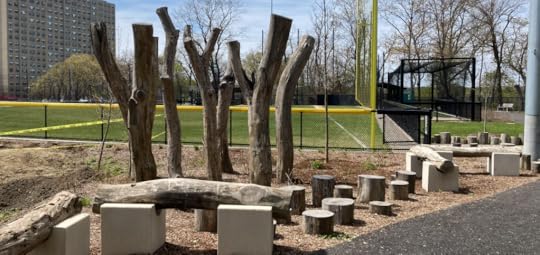
From my window I see the new tree that the City of Cambridge planted in the space between the sidewalk and the curb. Beyond that is the fresh pavement patch where they installed the new gas line. Across the street is the refurbished Glacken Field complex of playground and little league fields. My city is a place of constant upgrade. Why don’t I feel so good about it?
I first lived in Cambridge in 1978, but my true appreciation for our city began thirty years ago, when I bought a house in the Strawberry Hill neighborhood. I’ve lived here ever since. Cambridge circa 1992 was neither the industrial soap-and-candy city of the nineteenth-century, nor the hippy-dippy People’s Republic of the 1960’s and 70’s. It was a well-run city with outstanding services anchored in an ethos of citizen participation.
Two events from my early years made me a devotee of Cambridge.
The first was a well-attended neighborhood meeting where a representative of Traffic and Parking reviewed the city’s parking strategies. During Q&A, he listened to each person’s query and delivered a response based on deep knowledge of on-street parking. “There are two permit-only spaces in front of your house.” “There is a bus stop and a fire hydrant at your corner.” The audience gasped when I requested the city eliminate the parking restrictions in front of my house: the only homeowner asking for looser rather than stricter parking. The staffer took my question in stride. “You have three on-street spaces that face Huron Avenue. That entire street is permit-only. But you also have three spaces along Fountain Terrace. We could remove restrictions on those.” To this day, anyone from anywhere can park in front of my house for as long as they like. I believe most of my neighbors have forgiven my generosity. Probably not all.
The second event was an invitation to participate in the Strawberry Hill Planning Study. Back then, the Community Development Department facilitated year-long studies in which local residents learned how various city functions worked, and offered local ideas for improvement. Each neighborhood was addressed on a seven-year rotation. The process brought neighbors together, gave us insight into municipal operations, and provided a forum for dialogue. At the end of the process, the city prepared a report. I was happy to see many of our suggestions included, and subsequently implemented.

Thirty years later the City of Cambridge continues to provide excellent services. What has changed is the commitment to real citizen input. Or even useful communication. I appreciate that the city installed a new tree in my planted divider. I don’t appreciate that they did it without notice: I would have transplanted the ground cover I planted and maintain. I appreciate a new gas line in the street. I don’t appreciate no notice when they made the connection to my house. One day, for a few hours, there was simply no gas.
When it comes to the recent restoration of Glacken Field, I find little to appreciate, except how much money the city spent with so little listening. Glacken Field was a large open space with a softball diamond that doubled as a soccer field and dog run and frisbee spot. Like all threadbare places, it did not perfectly suit any particular purpose, but served many uses moderately well. For reasons unexplained, the city decided to put two of our three little league fields on Glacken Field.
At the public meeting, a cadre of staffers and consultants showed us bubble diagrams of where they planned to put the new fields and upgrade the tot lot. Anyone who asked a concept question – like why was our neighborhood getting these very specific-sized fields—was told those decisions were firm. If we asked specific questions—like could the outfield fences retract so during the 99% of time the fields weren’t little leaguing, we could still use them as dog runs—we were told those details were still in development. In short, the meeting was nothing more than the city checking a box of citizen input. They did not really want our input, and none was heeded.
The city’s bubble diagrams evolved into a construction of, frankly, outrageous proportion. Towering lights illuminate sodded, sprinklered fields for ten-year-olds. Dugouts. Bull pens. Bizarre pavement of end-grain wood that will surely rot out within two years. And then there is “the Guggenheim.” The moniker neighbors have given to the mound of circular ramp that exists for…who knows what reason. Up and over that hillock are even more bizarre elements, which we irreverently call the “Holocaust Memorial,” so much do they resemble the actual memorial in Berlin.

Perhaps I should have stayed involved in the design: there were probably other ‘neighborhood’ meetings. But when a taxpayer’s already been dismissed by the people he salaries, why continue? A bunch of consultants with a gigantic budget don’t care about the observations of someone who’s spent thirty years of living near and using Glacken Field.
What’s happened to Cambridge over the past thirty years is a fitting microcosm of the dilemma that plagues our nation. We assume that more and new is better. We are confident of being right, so we don’t need to give notice, let alone actually communicate. We talk past each other rather than to each other. The people who run our city have become bureaucratic oligarchs: they decide what’s best and they provide it. The only input required of it us: pay our taxes.
Cambridge is a very wealthy city, capable of executing all sorts of public works. But just because we ‘can’ do something, doesn’t mean that we ‘should’ do it. Glacken Field used to be a big open space where all kinds of activity occurred. For a modest sum the city could have reconfigured the existing diamond to little league scale, and added a second backstop and set of base paths on the opposite corner. We could have accommodated little league as well as soccer and dogs and frisbees. Instead, untold dollars later, we have a precious, highly specific space that fewer people use than before. Why?
June 21, 2022
Summer Solstice Celebration of Bicycles!
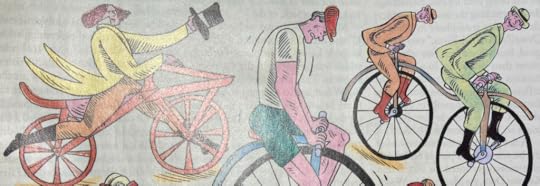
“The bicycle is a curious vehicle. Its passenger is its engine.”
John Howard, Olympic cyclist, set a speed record of 152.2 mph in 1985
It’s the longest day of the year up here beyond 42 degrees north. The weather is mild, the winds are calm. Perfect weather to get out and take a ride.
“Cyclists see considerably more of this beautiful world than any other class of citizens. A good bicycle, well applied, will kill most ill this flesh is heir to.“
Dr. K.K. Doty, 19th century physician
Jill Lepore is that rare and cherished writer who can make anything interesting. Her New Yorker articles—on any topic—are insightful and expanding. Imagine my thrill encountering her personal essay in the May 30, 2022 issue: “Easy Rider: Life on a Bike.” I plunged right into a favorite writer’s thoughts on a favorite subject.
“The bicycle is the most civilized conveyance known to man. Other forms of transport grow daily more nightmarish. Only the bicycle remains pure in heart.”
Iris Murdoch, Author
By New Yorker standards, “Easy Rider” is a puff piece; appropriate for this time of year and this lighthearted subject.
“To ride a bike, is to come as close to flying by your own power as humans ever will. No part of you touches the ground. You ride on air.”
Jody Rosen, Two Wheels Good: The History and Mystery of the Bicycle
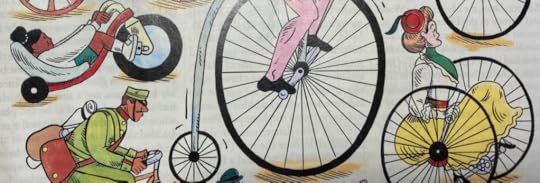
I firmly believe that everyone loves bicycles, except automobile drivers forced to share the road.
“Learn to ride a bicycle. You will not regret it: if you live.“
Mark Twain
Ms. Lepore addresses the intractable battle between big, heavy, fast machines and delicate, vulnerable, bicycles. She also centers the evolution and varying popularity of bicycling in historical context.
“The bicycle has done more for the emancipation of women than anything in the world.“
Susan B. Anthony
Still, “Easy Rider” devotes most of its energy to promoting the pure satisfaction of pedaling through life.
“It is by riding a bicycle that you learn the contours of a country best, since you have to sweat up the hills, and coast down them.“
Ernest Hemingway
Ms. Lepore weaves personal tales of every bicycle she’s ever owned with a curated, rather than encyclopedic, history of traveling on two wheels. She divvies cyclists up into three specific categories: cowboys, teenagers, and Old Woman. From age four, Ms. Lepore has pedaled firm in the ‘Old Woman’ category. Yet, despite her caution, she seems to have too many mishaps.
“Toleration is the greatest gift of the mind; it requires the same effort of the brain that it takes to balance oneself on a bicycle.”Helen KellerI fall square into ‘Cowboy,’ a category I consider confident rather than reckless. I make myself visible. If the road is narrow, I simply occupy it fully and make the honking cursers behind me wait for safe passing. It takes nerves, but as I’ve logged over 100,000 miles with only two accidents, (albeit each of them major), I have a better track record than the Old Woman. Then again, she is such the better writer.
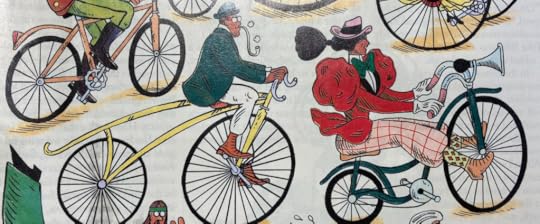 “I relax by taking my bicycle apart and putting it back together again.“Michelle Pfeiffer
“I relax by taking my bicycle apart and putting it back together again.“Michelle PfeifferThere are many things I’ll never do on my bicycle. I’ll never exceed 40 miles per hour (39 was my personal best, on a straight downhill on U.S. 90 outside of Pecos, Texas). I will never true a wheel or replace a crankshaft (my mechanical ability has been zilch since day one). I will never win a race – or even enter one.
“Those who wish to control their own lives and move beyond existence as mere clients and consumers — those people ride a bike.”Wolfgang Sachs, AuthorThere are some things I used to do on a bicycle that I don’t much now. I never run a stop sign or a red light, at least not before a full-on pause. I steer clear of gravel and dirt and mud paths. I hardly ever ride at night anymore.
“Whenever I see an adult on a bicycle, I do not despair.“
H.G. Wells
But the most important thing about riding a bike I still do, almost every day. Get out on the road and get where I need to go, under my own power, at my own speed, in my own time. It seems inefficient until you realize that while I travel, I exercise my body, and ease my mind. That’s a heck of a lot of useful multi-tasking.
“Life is like riding a bicycle. To keep your balance you must keep moving.“
Albert Einstein
There are more than twice as many bicycles than cars on the planet. I know you have access to one.
“Bicycling is a big part of the future. It has to be. There’s something wrong about a society that drives a car to workout at the gym.“
Bill Nye, the Science Guy
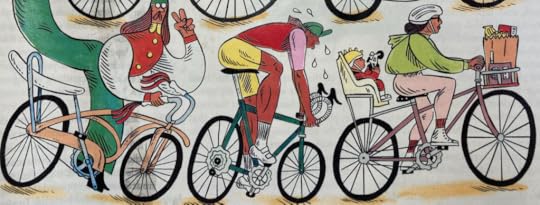
So on this longest day of the year, consider getting out of your car and onto a bike. Take a ride somewhere special, or nowhere at all. The world will be so much more beautiful. Your place in it will feel so fine.
“You are one ride away from a good mood.“
Sara Bentley, competitive cyclist
Illustration courtesy of Cari Vander Yacht, The New Yorker, May 30, 2022
June 15, 2022
Unsolicited Fatherly Advice
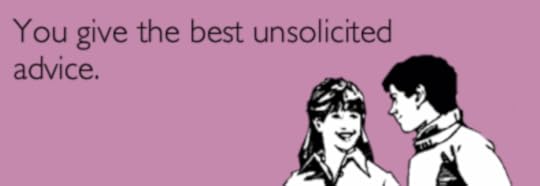
In time for Father’s Day, I read this vignette by Indrani Sen, Culture Editor for The New York Times. A thirteen-year-old girl, Sasha, asked her parents for permission to skip school. Her father, Matt Gross replied, “Not allowed. Nope!” and then offered this unsolicited advice:
“Next time you want to skip school, don’t tell your parents. Just go. Browse vintage stores, eat your favorite snack, lie on your back in Prospect Park, and stare at the clouds. Isn’t that the point of skipping school, after all? To sneak around, to steal time and space back from the arbitrary system that enfolds you? To hell with permission! That’s being a teenager—carving out a private life for yourself under the noses of the authority figures who surround you.”
I like to think I don’t give unsolicited advice. But of course, I do. We all do. Because…well…our advice is invaluable—or so we think. Besides, giving it away is as satisfying as it is easy. I admire Matt’s unsolicited advice to his daughter because it resonates with my own spirit of parenting. It also triggered an internal analysis: what advice did I bestowed upon my own children; how did it lodge in their heads?
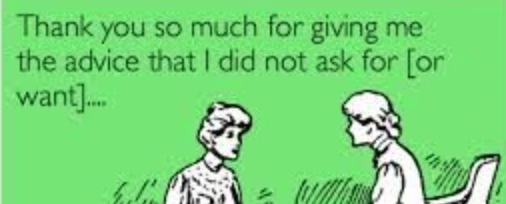
A father with an infant at the park, mid-day, mid-week, in 1989: it was a rare thing. Yet there I was, primary parent for our wee daughter, target of unending amounts of unsolicited advice. Every mother in the playground felt obligated (Compelled? Entitled?) to correct everything I did. “She’s too cold.” “She’s too hot.” “She’s hungry.” “She’s wet.” When my daughter was calm or cooing, the stream of unsolicited advice was steady. The moment she fussed, it became a torrent.
Over time, I grew accustomed to ignoring the advice (and the women who offered it). Though occasionally, I wound up and pitched back. Once, when my daughter was maybe two, shooting head first down the grand slide at Robbins Park in Arlington, an apoplectic mother ran up and shouted, “She’s going to get hurt!” Abby flew off the end of the slide, I scooped her into my arms, raised the exuberant critter to my face, and bussed her quivering cheek. Then I grinned at the meddler, and simply replied, “Not this time.”
My theory of parenting is simple. My job is to give my children enough rope to explore the world without hanging themselves. This attitude was considered too, too lax when they were infants and toddlers, yet far too restrictive for teenagers. By that time, I was chagrinned to learn that I had evolved from one of the loosest parents to one of the strictest. Even when they were in high school, I remained a stickler for sharing our days over nightly family dinners; for staying up until curfew to ensure they arrived home safe.
Parenting teenagers was my favorite phase of the job. I enjoyed the mental game of trying to figure out these emerging creatures much more than the physicality of raising toddlers or even the best-friendliness of their wonder years. As for infants, I’ve never met an honest woman who did not love that time best, nor an honest man who enjoyed that time at all.

I foisted two tidbits of conscious, unsolicited advice on my children. I’m quite certain that they remember one piece of dad wisdom to this day, and equally sure they’ve tried to forget the other.
At age twelve or so, I took aside my daughter; the following year my son. I asked them if they had any questions about babies, sex, that sort of thing. Short conversations, as each in turn, turned red and withdrew. Then I made my moral appeal. “I want you to do this one thing. Choose the first person you have sex with carefully. You are going to remember that person, and that experience for the rest of your life. Try to make it good.” The sum total of my unsolicited advice about sex.
The advice know they remember was this: “Break a law—every day.” I trusted my children to understand my intent. Not to become murderers or bank robbers, or consciously harm others. Rather, don’t be a cog in the system, obedient to the point of denying your individual spirit. Understand the rules of smooth society, but don’t be a slave to them.
My children are in the thirties now. Their contributions to our world are more impressive than their rap sheets. Impressive too, are their independent natures. They understood my cryptic advice and, just maybe for once, listened to their old man.
A short time after Matt Gross gave his daughter unsolicited advice on how to skip school; she did. Without prior approval. Way to go Sasha! Way to go Matt!
